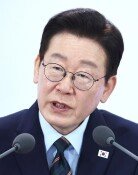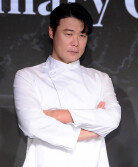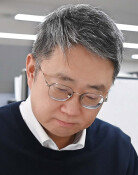[Opinion] Statistics, How Much We May Trust?
[Opinion] Statistics, How Much We May Trust?
Posted September. 26, 2001 08:57,
![[Opinion] Statistics, How Much We May Trust?](https://dimg.donga.com/egc/CDB/ENGLISH/Article/20/01/09/26/2001092633848.jpg)
This is a short story I read in a German textbook by Heinrich Boell. The protagonist`s job was to count the number of people who pass over the bridge, sitting on the bridge all day long. The numbers he counted became a useful statistic data to evaluate the usage and the efficiency of the bridge. Only one confounding problem was that he had to include `a girl` who he loved secretly in his mind, in the statistic data. However, when she appears at distance, he lost count of the numbers.
Even though my memory by the halting reading years ago has faded, the beautiful pain of the one who could not count his lover is still inscribed in my heart. Just like love, there are many things in our life that we will never measure by the statistical data. For those who believe in the accuracy of the statistics, the hesitation of the protagonist will be considered only as an unnecessary factor that increases the error of statistics. It is definitely true to this generation that would never acknowledge anything that cannot be explained or proved with evidences or statistics.
However, is statistics really objective? Is there any device to guarantee the credibility of the statistics? The answer would not be that simple. If the morality and the fairness of the statisticians are not assumed, the statistics are always in danger of being manipulated by specific interests and purposes. So, there is a joke. There are three types of lies a whopping lie, a specious lie, and statistical lie. It is probably a joke to point out the fallacy of statistics.
As if to prove the joke, the statistic data of the Employment Security Center exaggerated by 45 percent stunned everyone. People who have been confused by the government propaganda, for example, the reduced unemployment rate, now realize what happened behind the statistics. Coincidently, the real wages of the laborers calculated by the National Statistical Office was found to be inaccurate, allegedly by mistake. If the Statistical Office made a mistake in the statistical data, then who can we possibly trust? When the crucial accuracy of the statistical data is manipulated, other economic indexes and policies that have been established on this statistical data cannot be considered realistic.
Of course, there is always a room for an error. Mathematics and Sciences that we think are objective could be established based on repeated mistakes and errors of human. The book, `I think, therefore I mistake` by Jean Pierre shows such insights. He emphasizes that the scientific axioms, which are considered as rational and objective, are in fact based on mistakes and illusions, and he tries to reconstruct the history of scientific errors. He considers the desires, emotions, and preconceptions in the mind and heart of the researchers as crucial factors to formulate creative errors.
However, the manipulation of the statistics by the government is far from the romantic mistakes in a fiction and definitely not like an error that has developed in science. It`s only a comedy created by the bureaucracy that has excessively forced competence to achieve a visible result no matter what. And that is only a bit of iceberg that clarifies the fallacy of the statistics circulating in our society. The statistics will turn out to be a dangerous weapon when it makes errors for concealment and compromise instead of love and discovery.
However, not only the statisticians but also the over credulous consumers of the statistics data are responsible for the danger of statistics. The over-credulity in the statistic data often creates a grand illusion, which in turn becomes a hotbed of the irresponsibility and irrationality. We are living on the sea of statistical numbers. But we cannot escape from feeling like that human is excluded and the real life is missing. It is not a problem of statistics, except that our generation requires of more ethical reflections prior to the elaborateness of technology.
Na Hui-Deok (Poet, Professor of Chosun University)



![[단독]폴란드, 韓 해군 최초 잠수함 ‘장보고함’ 무상 양도 안받기로](https://dimg.donga.com/c/138/175/90/1/wps/NEWS/IMAGE/2026/02/27/133437397.1.jpg)



